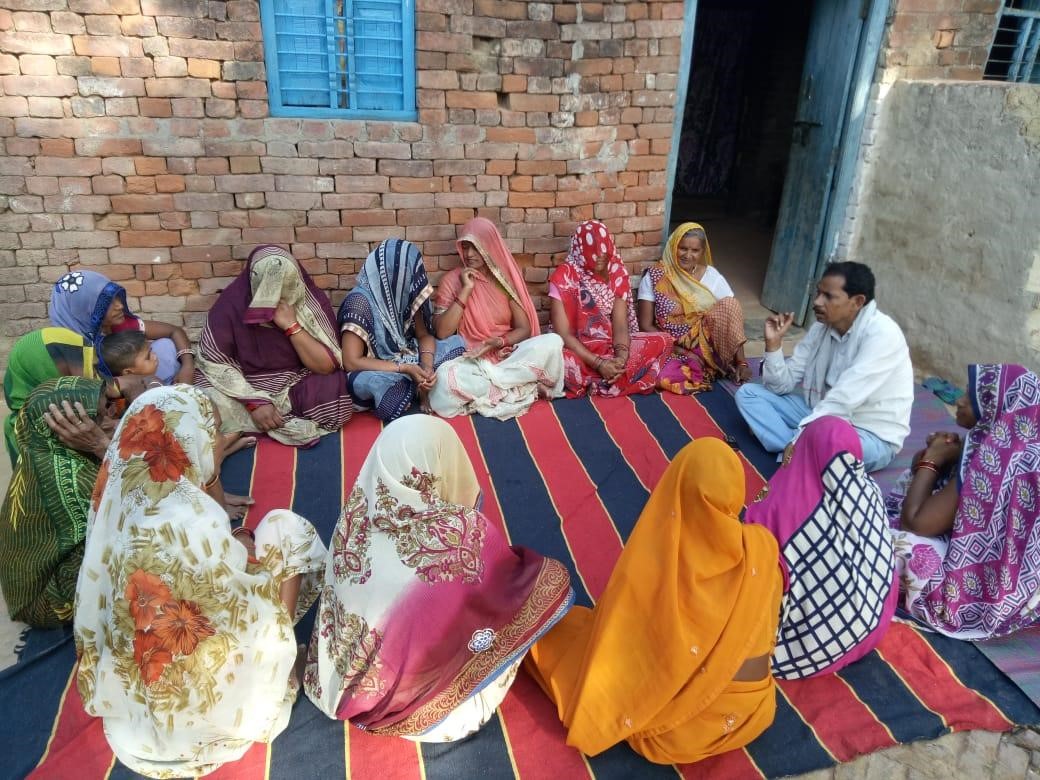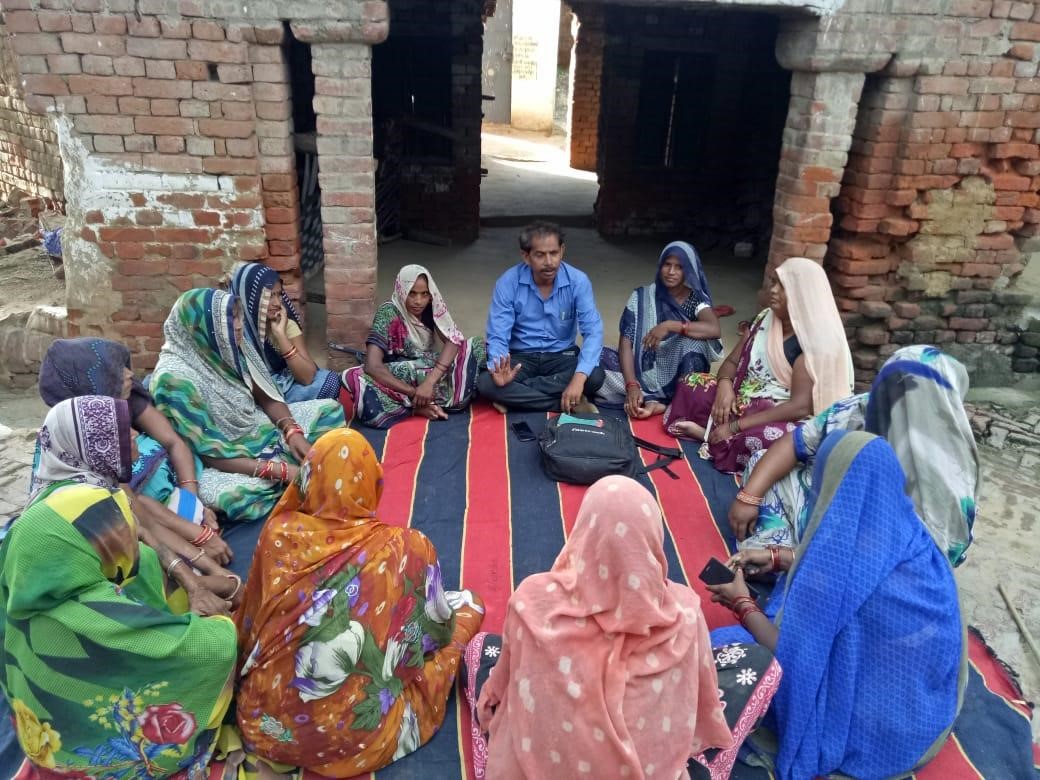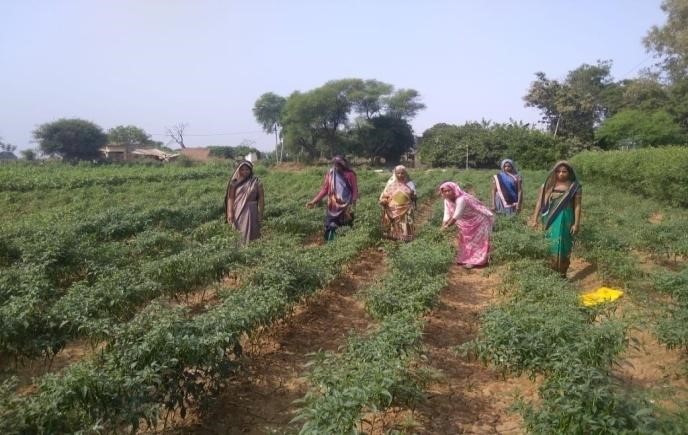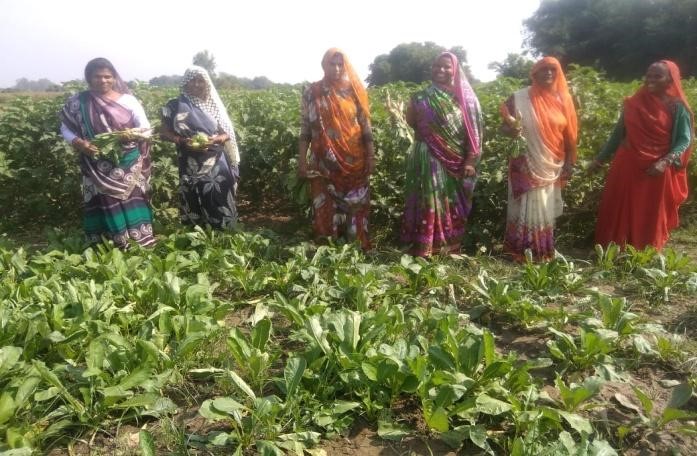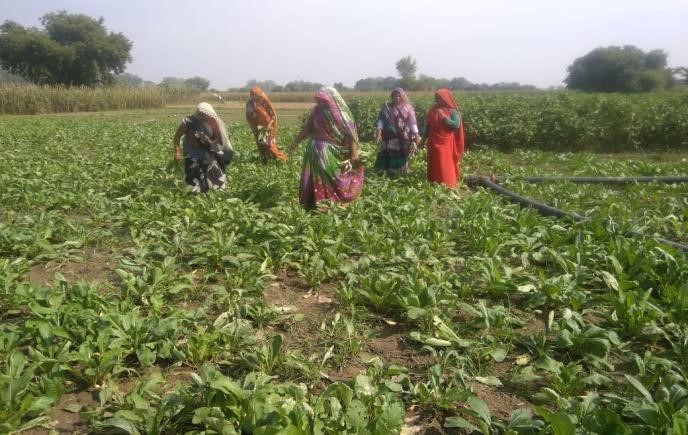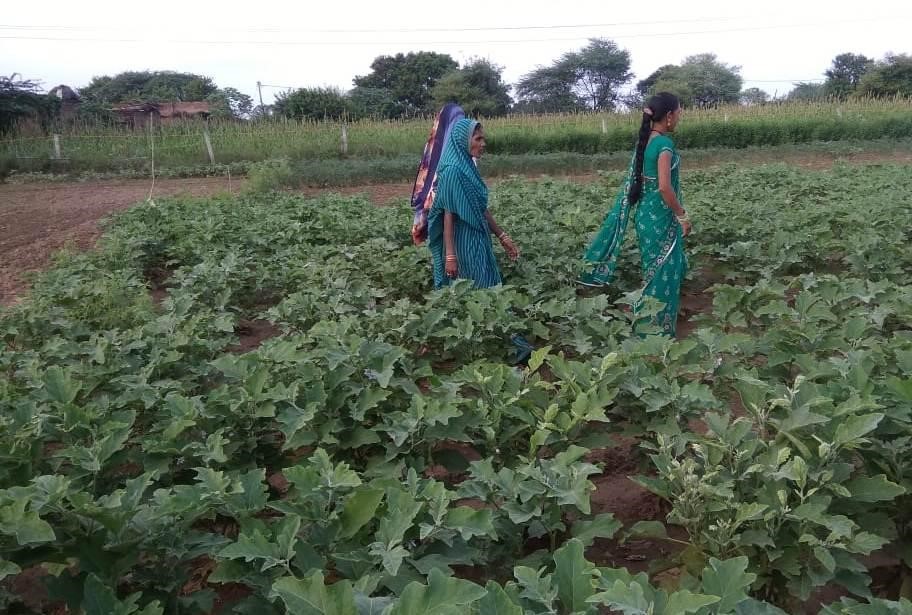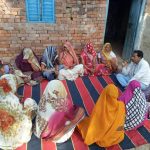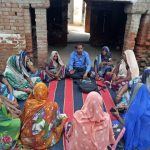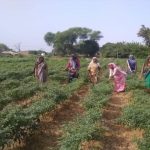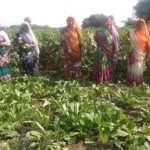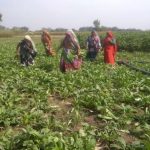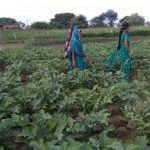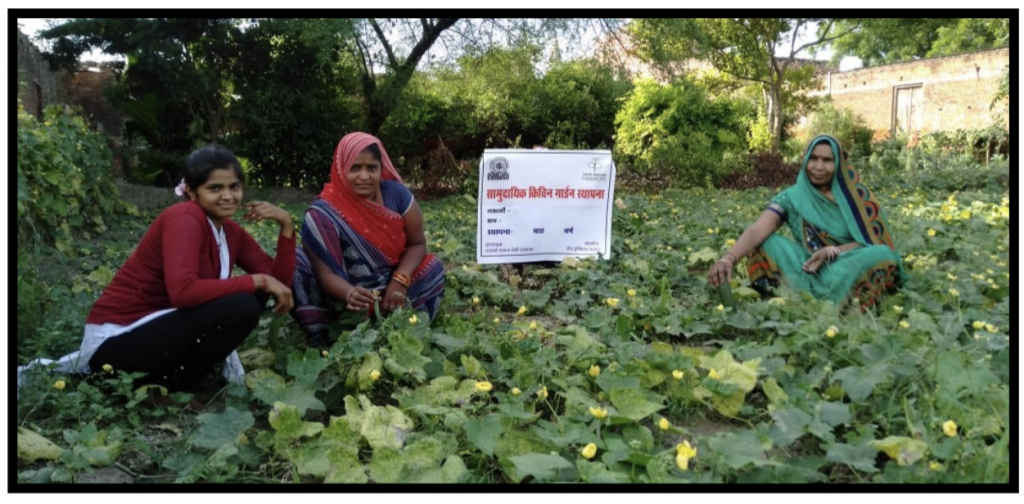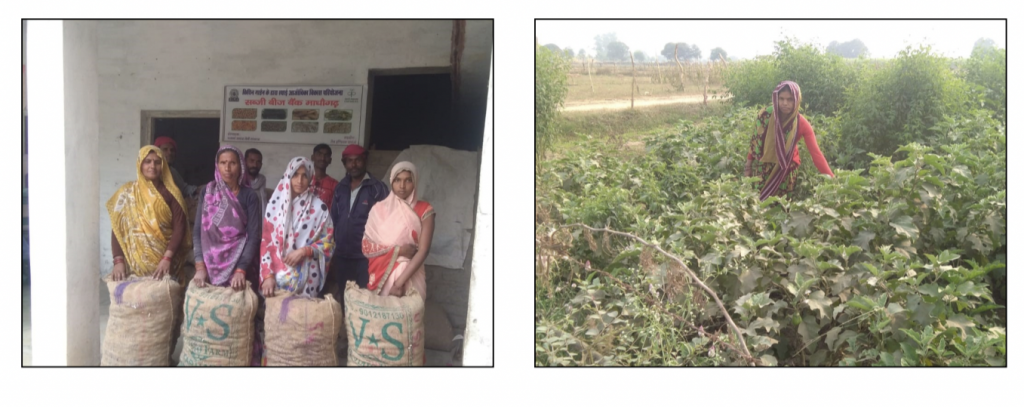Bundhelkhand Initiatives
The name Bundelkhand may bring to mind the famous Bollywood historical bio-pic “Bajirao Mastani”, where Mastani was born to Bundelkhand’s Maharaja. But what is less known is that the 13 districts of Bundelkhand (seven in Uttar Pradesh and six in Madhya Pradesh) are among India’s 200 most backward districts list. Eighty percent of the people here depend on agriculture and livestock rearing for their livelihood. Bundelkhand has been affected by severe drought for several years, so much so that the farmers have become day laborers and struggle to get enough food for their own families. What is startling is that many farmers in these villages have not been able to take up sowing at all. A survey of 132 villages by Parmarth Samaj Sevi Sanstha points at widespread loss of crops due to drought. This has affected lives of farmers in various villages in the area and increased the number of deaths and farmer suicides.
Problems Faced by Farmers
- Heavy burden of loans
- Crop failure due to drought, un-seasonal rain & hailstorm
- Lack of access to farming schemes and programs
- No knowledge of best practices in soil & water management
- Poor and marginalized families are not able to purchase vegetables, pulses, fruits and other nutritious food for consumption due to increasing prices of these items in market.
- Deteriorating health due to lack of nutritious food
Parmarth Samaj Sevi Sansthan is a non-governmental and non-profit organization, working for the weaker and deprived sections of the society. SIF has been working with Parmarth since 2017 in a concerted effort to create various programs to improve the health of farmers and their families, make them self-reliant for their food needs, encourage economic saving schemes and promote awareness on hygiene and nutrition.
Our Goal
Promotion of sustainable livelihood opportunities towards ensuring the food security of the poorest & marginalized community groups in a way that the community groups will be able to assert their rights & entitlements and gain access over essential services.
Our Objectives
- To form & strengthen community & women based institutions.
- To ensure sustainable livelihood opportunities of target families of poorest & marginalized community groups.
- To promote Sustainable and climate friendly Agriculture Practices.
- To work towards conservation & protection of water and soil resources.
- Promotion of micro finance and collective business activities for livelihood generation and income enhancement.
Challenges
- Destruction of vegetable crops due to floods
- Free Grazing
Impact
We made a huge impact in 2019, with the help of our partner Parmarth Samaj Sevi Sansthan
- In 20 villages of project area, total 67 SHG have been formed and a total of 572 women became members of the same.
- Out of total 67 SHGs, 42 SHGs have been linked with banking services by opening their bank accounts and 41 SHGs have been linked with NRLM.
- During reporting period, total 25 New Community Kitchen Gardens have been established
- During the reporting period, SHG members gathered together in 322 meetings organized in the region.
- 25 new kitchen gardens have been established under the project area. With this, while the food security of women has been ensured, along with them, additional income has also been ensured.
- 08 Land lease support has proved very helpful for the landless women of the project area. Through this, a large part of the landless farmers who were deprived of being benefited, now also benefited from this project and increased their income through vegetable production.
- 07 Irrigated pipe and 06 Wire fencing support has provided very helpful for the women of the project area.
- Through the seed banks, the purpose is to collect seeds conducive to the local conditions, ensure timely availability of seeds, preserve traditional seeds in villages and through these seed banks. Another purpose is to inform and spread awareness in the community to protect them from the private seed companies.
- 03 Farmer Producer Organization was formed with the objective of bulk marketing of vegetables produced in Kitchen Gardens under the project area, in which, more than 50 women joined membership.
In the previous years, we also supported 42 villages of Madhowgarh & Rampura Block of Jalon district, with the help of Asia Initiatives and 5 villages in Mohangarh ( Nandanpur, Koriya, Nadiya, Vangayn and Kanti) with the help of Healing Lives.
Please select each of tabs below to see latest updates for our initiatives in Bundhelkhand region.
- Self Help Groups
- Kitchen Gardens
- Education
- Seed Banks
- Land Lease
- Wire Fencing/Irrigation Pipes
- Machan Cultivation
Self Help Groups were established to strengthen the economic & social condition of women from the vulnerable communities of Project Area, Parmarth facilitated the formation and strengthening of Women Self Help Groups. During SHG meetings, members discussed monthly savings and inter loaning, family health, nutrition and reproductive health issues. They also discussed social security related Government Schemes and the processes to get benefits from those schemes.
Parmarth Samaj Sevi Sansthan has successfully implemented the 1st phase of kitchen garden project with the collective support of Save Indian Farmers and Asia Initiative. Impact of the same is also clearly visible which also influenced other small and marginal farmers to adopt the similar practices in their farms. In this regard, Parmarth initiated the 2nd phase of this program with the support of Save India Farmers in 20 villages to bring it in sustainable mode. The key component of this project is the Self Help Group, thus the organization decided to strengthen existing SHGs and promote other women from within the project area to form and join localized SHGs.
Our Progress in 2019
Within the project area, women of the target community are organized and self-help groups are set up with the aim of bringing changes in their social & economic status plus improvement of health and nutrition. During the 2019 reporting period, Total of 19 new self-help groups were formed, to which a total of 192 women were added. Earlier, a total of 48 self-help groups were established in the project area.
At present, a total of 67 groups are being operated under the project area. The accumulation of monthly savings and processing of internal loans are being conducted by these groups in a smooth manner.
Out of the groups formed under the project, Total of 41 groups have been linked with the National Rural Livelihood Mission (NRLM), so that these groups have been made available, as revolving funds, of Rs 15 thousand for each. Apart from this, Rs. 1.1 lakh was given to each SHG under the Community Investment Fund to 11 women SHGs. Its main objective is to increase the income of women, and to try to connect women with employment. These following efforts were made by the women of the benefited group in order to establish their own business: Goat rearing, Agriculture, Poultry, vegetable production as well as buffalo rearing etc..
During the 2019 reporting period, a total of 322 SHG meetings were organized with participation of 67 SHGs from 20 Villages.
Major topics discussed during these SHG meetings has been mentioned below:
- Vegetable crop selection for community kitchen garden
- Preparation of organic manure and spread the awareness among the community about the benefit of organic manure instead of chemical fertilizer.
- Awareness among the community towards cleaning the water source surrounding and clean community places through their own contribution.
- Regarding timely deposit the monthly saving in their SHG accounts
- Regarding follow up of Kitchen garden
- Collective marketing
- Establishment of seed bank
- Management of leased land and its efficient use.
- Demand generation for work under MGNREGA and collective application for toilet construction
Our Previous Efforts in this area
April – May 2017: During this reporting period, 3 New SHGs were formed. Total 33 SHG groups with 378 members are formed till now by the intervention of the project. Bank Accounts for 5 SHGs are opened in this reporting period. SHGs’ group meeting are organized on monthly basis. In the period of two months, 63 meetings were organized in which 613 members participated. The total savings of SHGs in this reporting period was 30,410 INR and total year to date savings of SHG is 72,990 INR.
July 2017: During this reporting period, a total of 18 Self Help Group meetings have been organized with participation from 284 women members. During these monthly meetings the total savings of all SHGs have been reported as Rs. 14250/-. Also 7 New SHG has been formed with the membership of 70 women.
August 2017: During this reporting period, a total of 28 SHG meetings were conducted in 28 villages with participation from 267 women members. A total of Rs.14050 was saved by these SHG groups. Bank accounts were opened in Allahabad UP Grameen Bank for three SHGs (one SHG from Asahana Village, one from Tor village and 1 from Maharajpura village). Also, 7 new SHGs with 22 women total were formed in 2 villages.
Kitchen Gardens Nutritious food intake is needed for healthy lives but economic status of the families act as hurdle in accessing nutritious food in their regular diet. For many years, the Bundelkhand region has become synonymous with drought and disaster. Poor and marginalized families do not enjoy nutritious food intake due to year-long food insecurity. In February 2017, Asia Initiatives approved a grant for a Social Capital Credits (SoCCs) kitchen garden project in 6 locations in Jaluan district of Bundelkhand to benefit 1200 women directly and a larger population of each area indirectly. Parmarth recruited one project coordinator and one nutritionist, and Social Capital Credits training was provided to them. By April 2017, 13 community kitchens were established, and a supervisor was recruited to monitor and document the progress. Our major goals for promotion of Kitchen Gardens are:
- To ensure access to nutritious food intake in families
- To increase the income level of families
- To promote measures of water use efficiency through kitchen garden
- To provide a healthy, comfortable and beautiful environment
- Safe recycling and management of household wastes through composting or as animal feed as well as by utilizing waste water.
Benefits of Kitchen Gardens
- Income and enhanced rural employment through additional or off-season production
- Increased availability of food and better nutrition through food diversity
- Environmental benefits from recycling water and waste nutrients, controlling shade, dust and erosion, and maintaining or increasing local biodiversity.
- Enhanced Health & nutrition status of targeted families
- Enhanced Economic status of women members
- Reduced Incidents of malnutrition and anemia among infants, adolescents & women
- Check on water logging problems in villages.
Our Progress in 2020
- Parmarth Samaj Sevi Sansthan, with the support of Save Indian Farmers has changed the lifestyle of rural people though backyard kitchen gardening training programme to the selected beneficiaries. During the month September-October, 41 beneficiaries from various SHGs were targeted and were encouraged to do for cultivation of diverse vegetables, primarily for household consumption.
- 41 beneficiaries was selected from Jai Nishad Raj SHG from Mallahanpura, RadheRadhe SHG and Jwala Devi SHG from Pachokhra village, Jai Mata Di SHG, Amar Ujala SHG and Jalaun Devi SHGs from Madepura village, RadheRadhe SHG and Jai Bhole Baba SHG from Kanjausa village, Mangla SHG from Gopalpura, Shiv SHG from Kanara village.
- In the month of September, organization provided with pack of seeds of seasonal vegetables, with harvesting period after 45-60days of plantation.
- And as a result the kitchen garden of 41 beneficiaries ultimately produced 57 quintal chilies, 31quintal-50kg eggplant, 46 quintal cauliflower, 10quintal-80kg tomato, 35 quintal-50kg radish, 14quintal-50kg fenugreek, 11quintal-50kg spinach and 90 kg beetroot from 29 bigha of land. Parmarth encouraged its women community leaders to be actively involved in kitchen gardening and provides hand-holding support like, in a village bhagwanpura, Jai Lakshmi SHG received rented land for kitchen garden so it ensured food and nutritional securities of their families.
- In addition to growing food for their family, the SHGs member got benefited by earnings from selling the excess produce of the vegetables they had grown from their kitchen garden to local market. By the end of month, the beneficiaries earned an income of Rs. 3,58,556 with net saving of Rs. 76,516.
- After success of kitchen garden program, 26other families have shown interest in kitchen garden. These other 26 other women were provided with following seeds-17quintal-14kg potato seed, 7kg-500gm onion seed, 100gm cauliflower seeds.
- 04 SHGs were provided 6 quintal wire-fencing support which helped them to protect their kitchen garden from animals.
- Apart from that the 05 beneficiaries were given training and supplementary material, organic manure like AmritPani and Jeevaamrit.
- 29 SHG where trained for weeding hoeing and guided for making of amritpani or jeevaamrit in their SHGs follow-up meeting under the guidance of Parmarth Samaj Sevi Sansathan team members.
Impact
- For rural resource-poor families, the economic benefits of kitchen gardens are beyond simple food production and subsistence. Apart from income generation and household economic welfare, this initiative promotes entrepreneurship, especially among women. Nonetheless, the earnings from the sale of kitchen garden products and the savings from consuming home-grown food products create an increased amount of disposable income for the beneficiary families, who invest the surplus income to fulfill other domestic requirements including purchase of additional food items, greater investment in education of children, and others.
- The initiative reduces hidden hunger and also curbs the possibilities of suffering from diseases caused by micro- nutrient deficiency by ensuring a small but continuous flow of subsistence food products in the daily household diet.
- Adequate nutrition is not only dependent on the quantity of food available. The seed kit provided by the organization ensures a range of essential micro-nutrients like proteins, carbohydrates, vitamins, magnesium, iron, folate, manganese, zinc, potassium, sodium, calcium, fiber, phosphorous among others for the beneficiary families. Thus, it is seen that kitchen gardens also aided in increased production and intake of micro-nutrient rich foods in 600 households, apart from diversifying the household diet and making it more interesting.
- The contribution of women in household food production has increased manifold, at times even making them the sole care takers of these gardens. It is seen that with time, kitchen gardening activities commensurate with their daily domestic chores, subsequently generating hopes for their socio-economic enhancement.
Our Activities in 2019
Establishment of Community Kitchen Garden
Parmarth Samaj Sevi Sansthan with the support of Save Indian Farmers have discussed the concept of community kitchen garden. In this process, members of SHGs were also made aware of the process, benefit and management of kitchen gardens. After mutual consent of all members, it was decided that the project will support “Seeds for Community Kitchen Garden” to SHGs.
In target villages, total 25 new community kitchen gardens have been established during the reporting period. A total of 73 kitchen gardens have been established in the project area so far, of which 48 were established under the first phase.
Kitchen Garden Maintenance
The kitchen gardens built in the past under the project area, were maintained by the members of the Self-Help group. As a part of the maintenance, the member women sprayed the crops by making AmritPani for germs and Jeevamrit for enhancer. Those whose kitchen gardens have been damaged were supported by seeds or plant saplings.
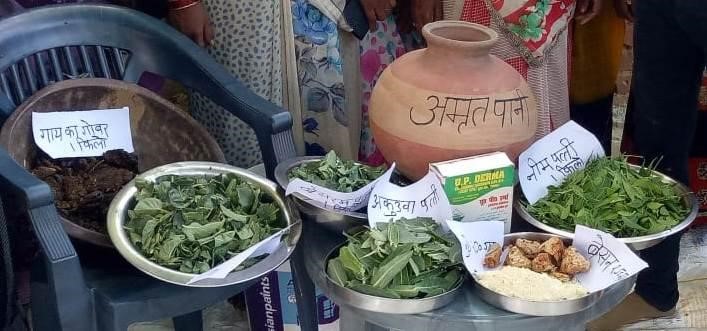
Organic Pesticides and Manure for the Kitchen Garden Maintenance
Jeevamirt is a spray which contains high micro nutrition values for quality growth of plants and it is being used in each kitchen garden in the project area. Similarly, project-area kitchen gardens have also been introduced to Neemastra, which is pesticide and helps in the quality of crop production. It not only kills enemy insects but also helps in development of crop friendly insects.
Our Previous efforts in this area
Our efforts and impact for 2017 work in this area include:
April 2017: In order to enhance nutritional status of the communities, green vegetables are made available in their regular diet by promoting self-made community kitchen gardens. Waste water from water sources and houses are purified using jute filters and utilized for irrigation in these gardens. During this reporting period, 6 new kitchen gardens were established and 32 previous kitchen gardens were maintained. Bio fertilizers and IPM Methods like Amrit Pani and Jiva amrit are used. Seasonal vegetables like Pumpkin, Guard, Chilly, Tomato, brinjal etc. were produced. Around 1088 kg production was gained in a month. 16 SHG Members are earning around 600 rupees per month from kitchen garden by selling vegetables.
July 2017: 04 new kitchen gardens were established in 3 villages i.e. Haidalpura, Teehar and Ramhetpura. In these 4 kitchen gardens, sowing of spinach, Coriander, Ridge Guard, Lady finger, Sugar beets and radish was done. While establishing kitchen gardens, the focus is on Amrut Mitti (nutrient-rich soil), which has abundant and diverse microbial life to support healthy plant growth. It is simple and inexpensive to prepare using kitchen waste and cow dung, and gives effective results.
August 2017: During this period, 6 new Kitchen Gardens were established in Maharajpura, Kanar, Dhamna and Himmatpura villages of project area. Plants of spinach, coriander, tomato, chilly, brinjal were sown in these kitchen gardens. Residents were sensitized and motivated towards using domestic waste water as well as organic manure for good quality vegetables in their respective kitchen gardens. A follow-up was done of the 30 kitchen gardens in 16 villages of project area to ensure proper implementation and maintenance. Total 38 Kitchen Garden were established by the project affecting 274 beneficiaries.
In 2019, training was organized with the aim of encouraging organic methods for low cost vegetable cultivation, to the farmers of the project area, especially women. During the training, agricultural scientist, Dr. Rajnesh Mishra from Krishi Vigyan Kendra in Jalaun, taught the qualities of sustainable farming practices to the target community in a two-day training program.
| SN | Date of training | Place | Subject | No of Participants |
| 1 | 05-10-2019 | Parmarthpuram, Madhougarh | Farmers training on Improved and sustainable vegetable cultivation | 60 |
| 2 | 25-11-2019 | Parmarthpuram, Madhougarh | Training on low cost vegetables cultivation methods | 52 |
Meetings of Women Farmers
25 community mobilization meetings were organized in 20 villages of Madhougarh and Rampura block cto make farmers aware of the concept of FPO and its importance. A total of 1597 people participated in these meetings, in which farmers were informed about the concept of FPO and the key strategy to market their produce.
| SN | Block | Village | No of Meeting | Participants |
| 1 | Madhougarh | 20 Village | 16 | 979 |
| 2 | Rampura | 09 | 618 |
Capacity building training of BODs of Women Farmers Producer Organization
A two-day workshop was organized on 13th-14th June in Madhougarh with selected Board of Directors and active members for Farmers Producer Organization formed in Rampura and Madhougarh blocks. During the workshop, the participants were briefed on various aspects related to the activities and operations of the Farmers Producer Company, as well as the functionalities and role of the BOD were discussed in detail.
Formation of Farmers Producer organization
Three farmer producer organizations have been formed in the project area with the aim of making the primary products produced by the women farmers of the project area or selling them at a reasonable rate by adding value to the products (Organic). This FPO has proved to be effective in encouraging the cultivation of organic products as well, because through this the farmers also get a fair price for their produce. During the reporting period, a total of 03 women farmer producer organizations were formed, in which a total of 77 women have taken membership.
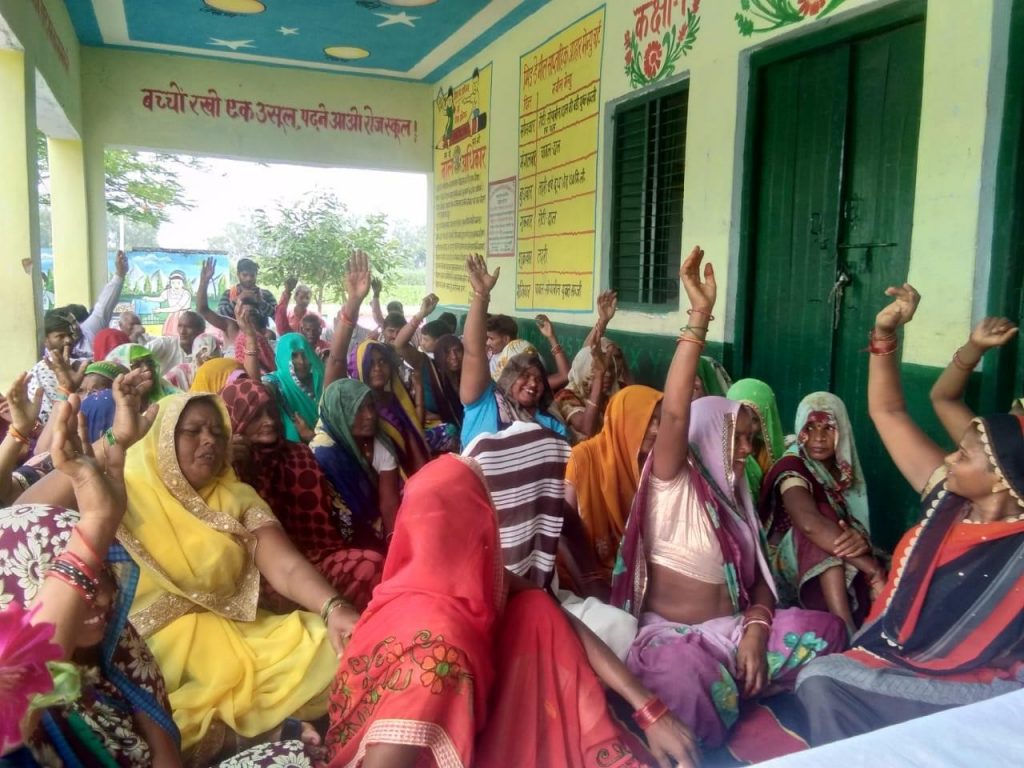
Meeting of FPO members in Bundhelkhand
Our previous efforts in this area
In 2017, A village Cleaning campaign was conducted in the villages of Soneypura, Damna and Tihar on the eve of International Labor Day (01 May 2017). Around 120 people from these communities participated in cleaning public places as well as sources of drinking water like hand pumps & wells and traditional water bodies like ponds. During the campaign, 16 hand pumps and 2 ponds were cleaned, apart from the grounds of primary schools. The villagers decided to repeat this activity every month through labor contribution.
An awareness rally was also organized on the ocassion of Groundwater week, and an awareness session conducted for school children to sensitize the village community to protect ground water through rain water conservation. 84 children participated in this event, and sapling plantation was done outside primary school premises.
Bundelkhand has been a region that is traditionally rich in natural resources. In the past, this region had dense forests and witnessed good agricultural practices. Despite limited irrigation facilities, the inhabitants of the region used good quality seeds for crops, which gave enough produce to meet the food grain requirements of the people all the year round. However, in the greed for more produce and with an increased emphasis on cash crops, slowly and gradually, people in the region have forgotten about their traditional seeds. Now, with the region experiencing a decade-long drought, the farmers are able to get only minimal produce from land and traditional seeds that require less water have become almost nonexistent.
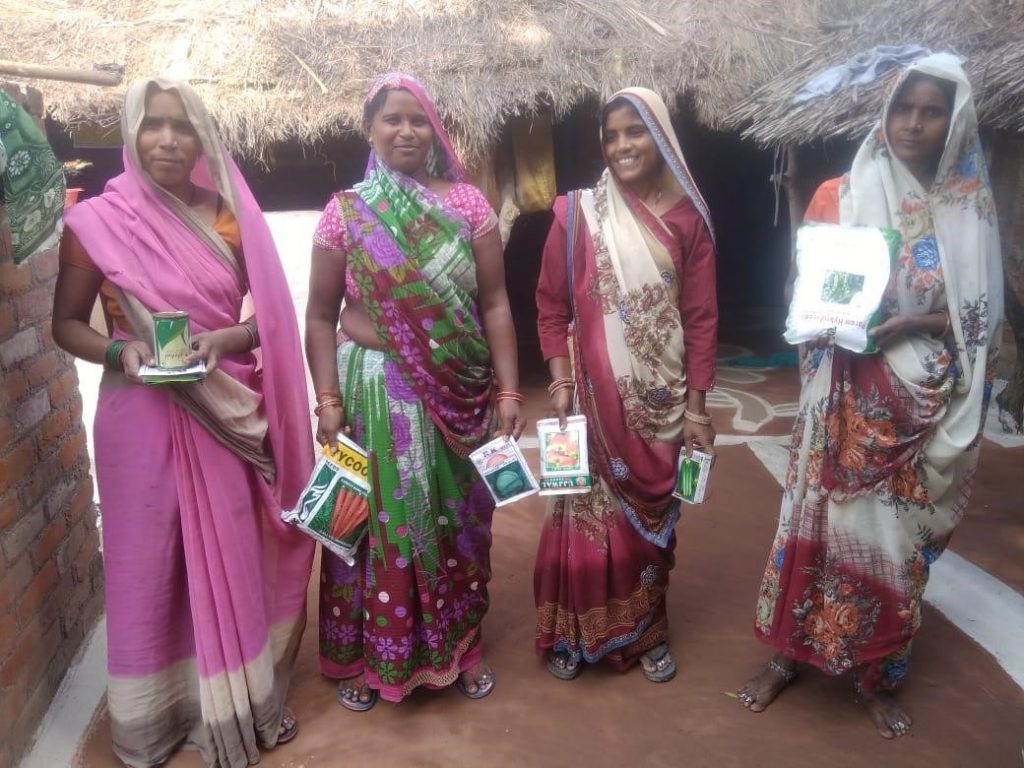
Seed Bank members in Bundhelkhand
In this backdrop, Parmarth, with the partnership of Save Indian Farmers, initiated the process of establishment of Seed Bank in the villages under the project area. The Seed Bank is a community-based system for collecting and preserving traditional, local seeds. Under leadership of SHG members the process of setting up seed banks in eight villages was established. Those villages are Gopalpura, Mallahanpur, Madhepura, Sonepura, Pachokhra, Himmatpura, Ninawali and Haidalpura. The Types of seeds that are most commonly kept in these seed banks include green pea, brinjal, spinach, radish, coriander, spinach, cauliflower, and carrot. For smooth implementation of the Seed Bank, by-laws have also been prepared.
With the aim of connecting the women farmers of the project area to the vegetable business, the women of the project area were supported with land lease through the project. Under this, the women farmers of the group are taking seeds provided by SIF and producing vegetables on the land leased for the kitchen garden.
The women farmers are not only able to keep some vegetables for their own families, but also are able to sell them for a profit and contribute towards the rent/lease of the land. With the aim of making the business profitable by selling vegetables, this activity is being encouraged more. In the year 2019, rent was provided for land to a total of 08 groups of SHGs.
|
SN |
SHG name |
Village name |
Block |
Area |
No of Beneficiaries |
|
1 |
Mahamaya SHG |
Sonepura |
Rampura |
01 Acre |
6 |
|
2 |
Parivartan SHG |
Haidalpura |
Madhaogarh |
01 Acre |
6 |
|
3 |
Maa Gayatri SHG |
Chhoti Bed |
Rampura |
01 Acre |
7 |
|
4 |
Om Shanti SHG |
Tor |
Madhaogarh |
01 Acre |
8 |
|
5 |
Jay Nishad SHG |
Malhanpura |
Rampura |
01 Acre |
6 |
|
6 |
Jay Bhim SHG |
Himmatpura |
Madhaogarh |
01 Acre |
7 |
|
7 |
Ambedkar SHG |
Sonepura |
Rampura |
01 Acre |
7 |
|
8 |
Jai Mata Di SHG |
Madepura |
Rampura |
01 Acre |
6 |
In order to ensure the safety of vegetable crops from wild animals and various other animals, wire support was provided to the beneficiaries of the community kitchen garden set up in the project area. Aside from fence support, with the purpose of providing irrigation facility in the Kitchen Gardens, pipes were also supported for these groups.
|
SN |
SHG name |
Village name |
Block |
Area |
No of Beneficiaries |
Support |
|
1 |
Parivartan SHG |
Haidalpura |
Madhougarh |
01 Acre |
6 |
Irrigation Pipe |
|
2 |
Mahila Sangathan |
Dhamna |
Madhougarh |
01 Acre |
6 |
Irrigation pipe |
|
3 |
Mangla Devi SHG |
Gopalpura |
Madhougarh |
01 Acre |
7 |
Wire & Irrigation |
|
4 |
Ambedkar SHG |
Sonepura |
Rampura |
01 Acre |
7 |
Wire & Irrigation Pipe |
|
5 |
Jai Mata Di SHG |
Madepura |
Rampura |
01 Acre |
6 |
Wire & Irrigation |
|
6 |
Gautam Buddh SHG |
Tor |
Madhougarh |
01 Acre |
08 |
Wire |
|
7 |
Shiv SHG |
Kanar |
Rampura |
01 Acre |
09 |
Wire & Irrigation |
|
8 |
Jalaun Wali Mata SHG |
Madhepura |
Rampura |
01 Acre |
06 |
Wire |
|
9 |
Jai Hind |
Kunwarpura |
Madhougarh |
01 Acre |
05 |
Irrigation Pipe |
Machan method of cultivation was demonstrated to the farmers of the project area with an aim to make the women of the project area produce more vegetables in less space and reduce the loss of vegetables due to melting. Here is a list of our beneficiaries from this initiative.
|
SN |
SHG name |
Village name |
Block |
Area |
No of Beneficiaries |
Support |
|
1 |
Parivartan SHG |
Haidalpura |
Madhaogarh |
01 Acre |
06 |
Machan |
|
2 |
Mangla Devi SHG |
Gopalpura |
Madhaogarh |
01 Acre |
07 |
Machan |
|
3 |
Ambedkar SHG |
Sonepura |
Rampura |
01 Acre |
07 |
Machan |
|
4 |
Jai Mata Di SHG |
Madepura |
Rampura |
01 Acre |
06 |
Machan |
|
5 |
Jalaun Wali Mata SHG |
Madhepura |
Rampura |
01 Acre |
06 |
Machan |
|
6 |
Jay Nishad SHG |
Malhanpura |
Rampura |
01 Acre |
06 |
Machan |

